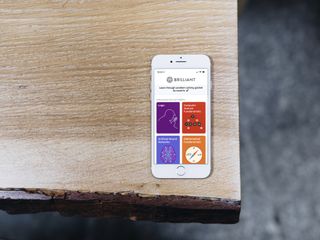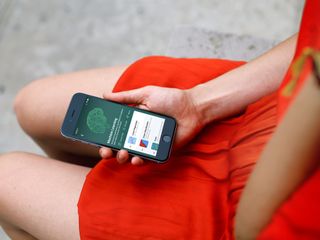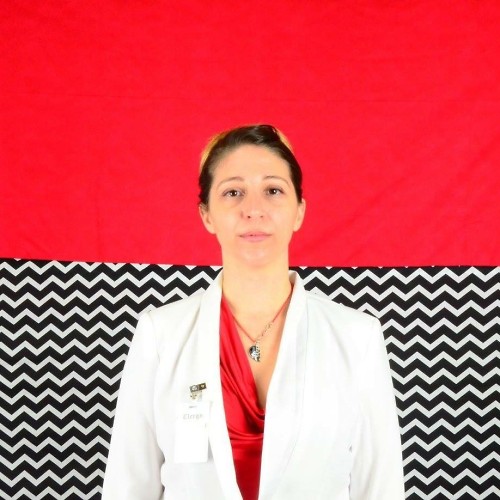
Math is one of those subjects I've grown to love. When I was halfway through college, I realized I enjoy the feeling of taking something that seems incredibly difficult to understand at first, but makes sense to me with a bit of knowledge and practice. I didn't know as a kid that it could be so fun. I kept my head down and just did the basics. No one like me was excited about Math, so I figured I shouldn't be either.
If I had access to something like Brilliant when I was a kid, well ... you probably wouldn't be reading my words right now. Brilliant is a math, science, and computer science resource app that's designed to help you grown in those subjects you are passionate about. It features courses and lessons, plus daily challenges, community engagement, and a whole lot more. Whether you're relearning the basics or having fun with more advanced STEM subjects, you can dedicate a few minutes every day to growing your math skills and critical thinking.
Check out Brilliant in the App Store
I was lucky enough to get in touch with Sue Khim, co-founder and CEO of Brilliant for an email interview about her passion for math, her experience growing Brilliant into a 7-million-member service, and how to show girls they can have fun with STEM subjects, too.

How did you get into programming? What sparked your desire to go down the path of tech?
Necessity! (Or maybe laziness.) One of my first jobs was an internship where I was dealing with massive, gnarly spreadsheets and reconciling calculations. I dislike repetitive, error-prone work, so I did as much as I could in the spreadsheet itself with Excel formulas.
But for some data ingestion jobs and other file maintenance work, learning VBA [Visual Basic for Applications] and writing macros was much faster than doing the work manually. I bought a book and stayed up all night automating all of the work I had been hired to do – it was really fun.
I wanted to spend my life doing something that would be of some service, something that had a shot at being meaningful to struggling but ambitious people like me.
Once I entered college, my family was in dire financial straits and I learned programming primarily to make money, since it paid well. The more I got into it, the more I was impressed by the ability for software to solve a problem once, and elegantly. It sounds corny, but I felt deep satisfaction from that. Because of this time in my life, I also knew in a serious way that I wanted to spend my life doing something that would be of some service, something that had a shot at being meaningful to struggling but ambitious people like me.
I read that you taught yourself to code. Where did you start? What were your first steps?
I started really getting into writing code between high school and college, but in retrospect, I think I had a lot of foundational training that made programming feel natural to me. I had always been interested in math, so I liked tackling problems that involved logic, problem-solving, and algorithmic thinking. It was comfortable for me to tinker with things until they worked, treating my programs like a fun puzzle to strategize around, and then try implementing a solution. I'd settle on a direction, write and run the code and get an error, curse like a sailor, and then hunt down the issue – it was very similar to solving a math problem.
Typically, I started with something I wanted to make. Then I prioritized understanding how and why that thing works (e.g., how does a personal email server work?), rather than diving into "coding" stuff that I didn't fully understand. I found resources that explained the underlying plumbing to be more useful than tutorials where you could robotically follow instructions and copy and paste lines of code. At least when I was first learning programming, many of the tutorials I found online were overly focused on specific syntax.
After I understood all of the steps that I would need to take to solve the problem, I would find documentation and code samples, which by this point I could actually make some sense of, then start actually writing code.
Brilliant provides a community for math enthusiasts, sort of like an after-school club with 7 million members. When you first decided to develop Brilliant, what was your goal, and did you think it would ever grow to be as big as it is today?

When I was in college, I watched a lot of online lecture videos, but couldn't find much in the way of deeper interactive learning. I wanted a product that would enable me to think about interesting questions and tinker with interactive problem solving, which is the only way that I was able to effectively learn math and science.
The user growth surprised everyone, but today I think we understand it as the desire for curious people to be able to learn in a way that is inviting and driven by your own curiosity, rather than intimidating and driven by fear of a test.
Today, Brilliant (brilliant.org) creates fun and interactive learning experiences in math, science, and engineering for people ages 10 and up, available through its website and apps. We enable anyone to nurture their curiosity about STEM. With members solving nearly 10 million problems a month, Brilliant is making huge strides towards this goal.
Our learning experiences are designed around our principles of learning, which in summary are the following. We believe there are 3 main things a great education can accomplish:
- Foster an internal drive to learn, so that you're comfortable picking up new skills
- Develop critical thinking skills, so that you can problem solve in new situations.
- Destigmatize failure and anxiety around not knowing the answer, so that you learn to persevere on projects with no formula, and take risks to find new answers
Math and science, presented correctly, can help you grow all of these skills. These subjects are fundamentally about the art of explanation, not computation. How do we explain the world around us? How do we reason our way through a problem? How can individuals, and humanity, persevere to understand the unknown?
The world doesn't need human calculators anymore. Most of your life, you're going to be solving new problems, and learning new skills to solve them. In the modern world, internal drive for learning, curiosity, problem-solving, and perseverance in the face of ambiguity and failure are essential to success.
Do you see a lot of girls and young women participating in the Brilliant community?
Yes and no. About 2.5 million of our users are girls and young women. However, we have a majority male user base, and they're also more vocal in the community discussions. We still have a lot of work to do here.
Do you have any method for engaging girls and women more in STEM subjects?
Making an effort to showcase rockstar minority-group role models in the STEM industry will go a long way toward showing girls they can be anything they want to be.
I think role models are important, and encouragement is important. Doing the work in our local communities to articulate, especially to minority groups, that the sciences are inviting to anyone who is curious, and making an effort we make to showcase rockstar minority-group role models in the STEM industry, will go a long way toward showing girls they can be anything they want to be.
A great way to find role models is to read biographies. I've always felt deeply inspired by great women in STEM – Marie Curie, Grace Hopper, Margaret Hamilton, Donna Strickland, Jennifer Doudna, Maryam Mirzakhani, and Karen Uhlenbeck, just to name a few. They're proof to me that anyone with the interest and determination can be a titan in the field.
Another way to find role models — people who are like you who have done it – is through Brilliant's unique and vibrant community. You can engage with other enthusiastic people of all ages from around the world through our website and apps, on which we host daily concepts and challenges. Brilliant's community not only solves the challenges, but they also share ideas and discuss potential solutions. Members can add comments and walk through solutions with people around the world working on the same problem. People of all ages and academic backgrounds discover different ways to solve something, learn from others' real world experiences with the topic, or dive deeper into the theoretical concepts behind the problem.
All of that said, I think it's also important to allow girls to say they're not interested and pick a different career they're more passionate about.
As someone that started very young, always loved math, and taught yourself how to code, you're a strong role model for young women. Do you have any advice for girls that might be intimidated with STEM subjects, but want to get started?

Find an area that you enjoy, and just dive in. This could be a puzzle that intrigues you, a question that sparks your interest, or something you want to make. Then explore everything about it until you know it well enough that you can explain it to someone else. Whatever you do: don't compare yourself with anyone else, or worry about how much you don't know.
If you're intimidated because you're a young woman, consider the data. The most compelling look at this that I've seen was in the recent book Behave by Robert Sapolsky. To summarize a key section:
"A 2008 paper in Science that examined the relationship between math scores and gender equality in 40 countries found that the more gender-equal the country ... the less of a discrepancy there is in math scores. By the time you get to the Scandinavian countries, it's statistically insignificant. In Iceland, deemed the most gender-equal country at the time of the study, girls are better at math than boys."
Being a woman won't hold you back from being top notch at STEM – just keep learning and don't feel intimidated.
Master your iPhone in minutes
iMore offers spot-on advice and guidance from our team of experts, with decades of Apple device experience to lean on. Learn more with iMore!
Lory is a renaissance woman, writing news, reviews, and how-to guides for iMore. She also fancies herself a bit of a rock star in her town and spends too much time reading comic books. If she's not typing away at her keyboard, you can probably find her at Disneyland or watching Star Wars (or both).

